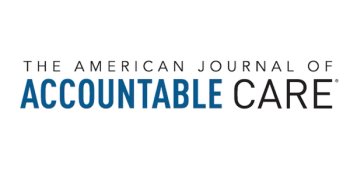
Employers
Latest News

Contributor: Providers and Employers Need to Collaborate More to Avoid a Greater Crisis
Latest Videos

More News

Ashok Subramanian, MBA, founder and chief executive officer, Centivo, speaks on the limitations of traditional employer-based health benefit plans in the pursuit of value-based care and what employers should consider in designing these incentives on a community level.

Jessica Brooks, MPM, president and chief executive officer, Pittsburgh Business Group on Health, spoke on the core themes of her keynote address related to diversity, equity, and inclusion at the 2022 Greater Philadelphia Business Coalition on Health annual conference.

Neil Goldfarb, president and chief executive officer of Greater Philadelphia Business Coalition on Health (GPBCH), provides an overview of the core discussion points and other aspects in-person attendees can look forward to at the 2022 GPBCH Annual Conference.

Taking Action Against the Rising Mental Health Crisis: Efforts From Health Plans, Congress, and More
Marking Mental Health Awareness month, stakeholders involved in the delivery of behavioral health care services discuss current efforts underway—spearheaded by the novel 988 emergency hotline—to address the growing mental health crisis.

Lower-salary employees in high-deductible health plans underutilize outpatient care and overutilize emergency departments.

Representatives from employers, pharmacy benefit managers, and others discussed methods of improving pharmacy access and affordability in health plans.

Key opinion leaders addressed cost, accessibility, and other barriers limiting use of comprehensive genomic profiling (CGP), and how employers can help drive preventive care and precision medicine through CGP.

Findings of a survey of large employers indicate that utilization management tools are ineffective in controlling health care costs for employees and may lead to barriers to treatment.

Survey results demonstrate an opportunity to incorporate good practices for high-deductible health plans that can help enrollees maximize value and better navigate their benefits and treatment options.

A webinar by the National Cancer Treatment Alliance discussed current use and diagnostic/therapeutic benefits of comprehensive genomic profiling in oncology, as well as recommendations for employers and benefit consultants considering biomarker testing.

Speaking during a webinar presented by the National Alliance of Healthcare Purchaser Coalitions, experts weighed the pros and cons of employer high-deductible health plans (HDHPs) and outlined steps to address challenges raised.

Part 1 of a 2-part webinar series by the National Alliance of Healthcare Purchaser Coalitions addressed issues in health care coverage affordability and how equitable health benefits and value-based design can reduce cost while improving employee engagement.

Key opinion leaders discuss the state of mental health in the US workforce, persistent unmet needs, and efforts to improve coverage and uptake of behavioral health services.

Findings presented at the 2021 American College of Rheumatology Annual Meeting showed that patients with concomitant psoriasis and psoriatic arthritis (PsA) reported greater incidence of obesity, hypertension, and diabetes, as well as a higher likelihood of work inability than those with only psoriasis.

Appeals court affirms decision to place a hold on the Biden administration's COVID-19 vaccine mandate for large employers; rising Medicare premiums linked with controversial Alzheimer drug; 3 states expand COVID-19 booster shot eligibility to all adults.

Pfizer and BioNTech expect to seek emergency use authorization for their COVID-19 booster vaccine in all adults 18 years and older; the Biden administration urges appeals court to not block employer vaccine mandate; nearly 8 in 10 Americans believe or are unsure of false COVID-19 information.

The Department of Labor rules will affect employers with 100 or more workers.

On this episode of Managed Care Cast, we speak with Ellen Kelsay, president and CEO of the Business Group on Health, on the findings from her organization's 2022 Large Employers’ Health Care Strategy and Plan Design Survey.

Provision of enhanced access to behavioral health services by a large employer to its employees is associated with reductions in all-cause care utilization and cost.

The Academy of Sleep Medicine and the Sleep Research Society issued guiding principles for employers on designing optimal work shift durations in the workplace, which address risk factors, countermeasures, and shared decision-making implications.

This study examines the ability of self-insured employers to negotiate hospital prices and the relationship between hospital prices and employer market power in the United States.

Health insurance companies are anticipating a swell in pent-up demand for delayed or forgone health services in 2020, as well as increased costs associated with distributing COVID-19 vaccines to millions of Americans. To offset the potentially precarious business impact caused by these converging factors, insurers are turning to technology for help.

Patients worldwide are reluctant to visit clinics and hospitals amid fears of COVID-19. Implementing virtual care capabilities can not only relieve the patients of this fear by minimizing in-person exposure and preventing the virus from spreading, but also improve patient-centered care delivery.

Agility has long been a big buzzword, but its salience and importance has been growing. Gallup’s research on agility finds that there are 7 fundamental shifts common to highly agile leaders—driving these changes through a hospital can help significantly advance a culture of agility.

The Accurate Healthcare Insights survey identified notable changes in human resources policies and practices for health care organizations during the pandemic, with technology use projected to increase by 60% compared with prepandemic levels.














